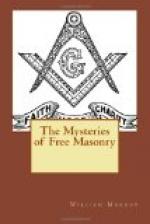The Lodge being opened and ready for business, the Right Worshipful Master directs the Secretary to read the minutes of the last meeting, which generally brings to view the business of the present. If there are any candidates to be brought forward, that is generally the first business. A Master Mason, wishing for further light in Masonry, sends a petition to the Chapter, and requests to be advanced to the honorary degree of Mark Master Mason; if there is no serious objection to the petition, it is entered on the minutes, and a committee of several appointed to inquire into his character, and report to the next regular communication: at that time, if the committee report in his favor, and no serious objection is made against him otherwise, a motion is made that the ballot pass; if carried, the Deacons pass the ballot boxes; these boxes are the same as in the preceding degrees. When the balls are received, the box is presented to the Right Worshipful Master, Senior and Junior Wardens. R. W. M.—“Clear in the West, Brother Senior?” S. W.—“Clear, Right Worshipful.” R. W. M.—“Clear in the South, Brother Junior?” J. W.—“Clear, Right Worshipful.” Right Worshipful Master says, “Clear in the East.” This being the case, the candidate is accepted; but if there is one black ball in that end of the box which has the white tube, and the Senior Warden pronouncing “Not clear,” all stop, and inquiry is made, and the ballot passes again; and, if blacked a third time, the candidate is rejected. It being otherwise, the Senior Deacon, who is the candidate’s conductor, passes out of the Lodge into the adjoining room, where the candidate is in waiting, and there the conductor is furnished with a small oblong square, six inches




